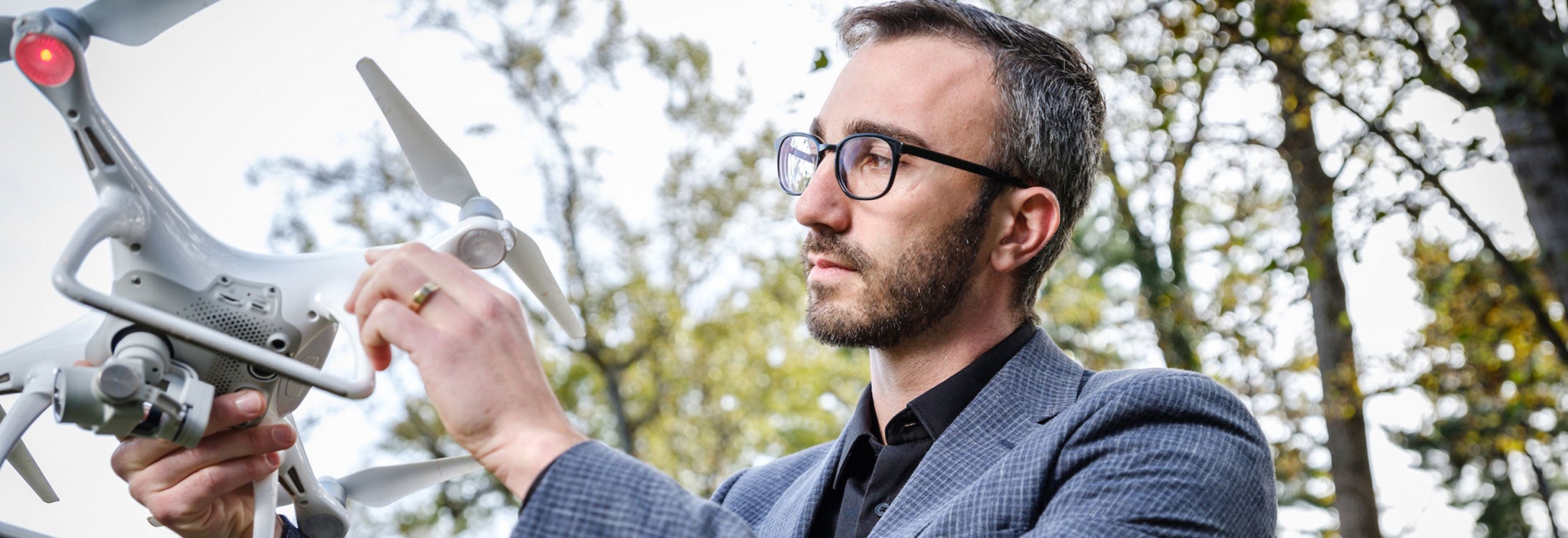Chris ZarZar (MA 2014)
Current Position & Responsibilities:
“Assistant Professor, North Carolina Central University; As an Assistant Professor in the Department of Environmental, Earth, and Geospatial Sciences, I teach a variety of geoscience courses including Earth Science, Geology, Oceanography, Atmospheric Science, Climatology, and Unmanned Aerial Systems. I am engaged in campus initiatives to enhance student learning opportunities such as the development of informal outdoor learning spaces and helping maintain the Campus Gardens. My research includes internal and external collaborations with industry and government partners (NC State, Wake Forest University, NC A&T, Carthage College, and Mississippi State University) in exploring how human changes to land cover affects precipitation characteristics, improving local-scale precipitation forecasting, advancing flood prediction and natural hazard risk communication, evaluating water quality monitoring and remediation techniques, characterizing seafood access and equity, and using drones to enhance informal STEM education and literacy. In addition to my work as an Assistant Professor, I am the founder and president of Zarzar Earth Science Solutions, LLC, where I develop hydrometeorological products for a variety of transportation, weather, military, and government stakeholders.”
What are the most rewarding and/or most challenging aspects of your work?
“The most rewarding part of my work is having the opportunity to foster and grow a student’s passion in the Geosciences. Whether in the classroom or in the field, seeing that lightbulb moment when a student realizes their passion and excitement to explore our Earth is always the best moment of my job. I love the flexibility of being able to involve students in my research, mentor students to their career goals, and teach beyond the classroom. This flexibility also allows me to connect with people from a variety of backgrounds and find ways to put the science into practice to help save lives and property.”
How did your degree(s) in Geography prepare you for this position?
“My work requires a great deal of collaboration. Whether that is with industry, government, and/or university partners, having knowledge of other disciplines and how they fit into our understanding of Earth and human interactions is essential. This is what my M.A. in Geography has prepared me to do. A degree in Geography prepares you to be the indispensable bridge between the sciences and the real world. In today’s workforce, the challenges at hand require someone who has a spatial understanding of Earth processes, can reach across discipline lines to solve the most pressing problems, and can effectively communicate the science with community stakeholders. Furthermore, my M.A. in Geography from ECU’S DGPE trained me to be an integrative thinker, honed my communication skills, and connected me with professional networks that supported me in establishing myself in academic and private-sector fields.”
What else do students need to learn (beyond the degree) and who should they be talking to in preparation for entering the job market?
“Students need to be confident in their education but humble knowing that there is much more to be learned from practitioners in every field. Having good conversational and organization skills is imperative for managing professional relationships and time in the fast-paced job market. Students need to learn how to take initiative and preemptively reach out to potential employers to introduce themselves. It does not matter whether a position is open, requesting a conversation to meet and learn from a potential employer will open more doors than someone may imagine. My first job in the private sector and my first academic position came from such introductory emails, not formal applications. Students should work closely with the DGPE faculty and the career center to learn how to draft a “cold” introductory email and to develop an effective resume and cover letter. Furthermore, students should be reaching out to recent graduates, mentors, and professionals via phone and/or email to build up their professional networks, learn about opportunities, and discover the variety of career paths a degree in Geography makes available to them.”
What was your favorite or most memorable experience
“The DGPE community. My time as a graduate student in ECU’s DGPE were some of the greatest days of my life. I met some of my closest friends and have remained in close touch with faculty and students alike. There are no words to describe just how amazing my experience was as a Master’s student. The DGPE is a tight-knit, loving, fun, and supportive community like no other. The opportunities that come from a degree in the DGPE are plentiful, and the friendships are forever. If there was one memorable experience I had to reflect on, I would have to say serving refreshments to the community with the Geography Club at Freeboot Fridays. But between the comradery developed during late-night projects in the GIS lab and evening discussions in Dr. Popke’s graduate seminar course, there is nothing better than the memories made in the DGPE. “
